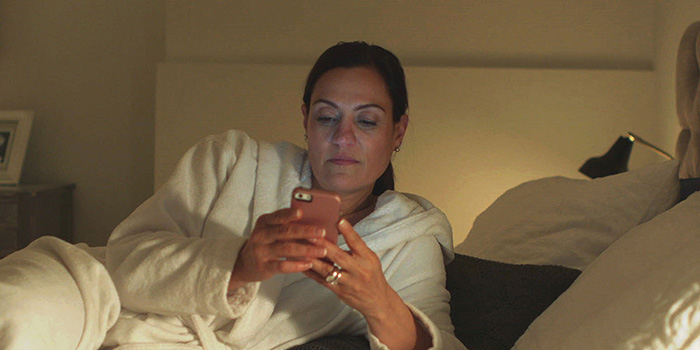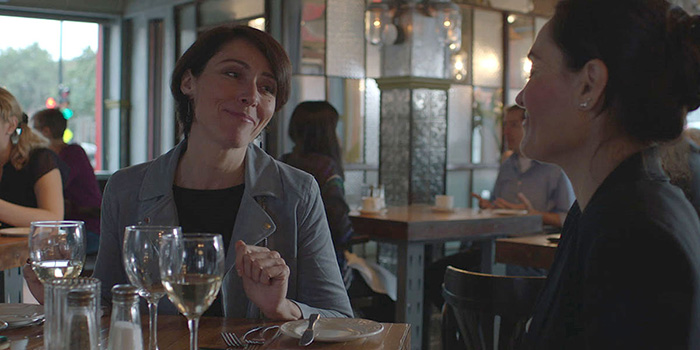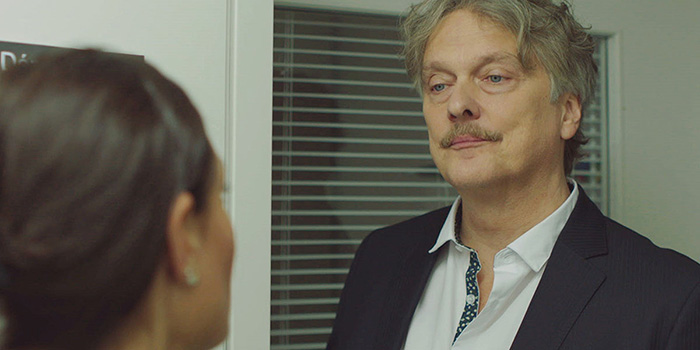Can skin tell the difference between love and desire? It’s an intriguing question Marie-Claire (Brigitte Poupart) can’t help but want to answer as a dermatology professor and lover of sex if only to supply a reprieve from the usual carcinoma studies her doctorate students tediously gravitate towards. She knows the young woman who presents it (Charlotte Aubin’s Sofia) is up to the challenge scholastically, but unsure experimentally. So Marie-Claire takes it upon herself to collect samples of her own cells before and after masturbating, those from a one-night stand (Paul Ahmarani’s Louis) she met at lunch one day, her husband Adam’s (Vincent Leclerc), and who knows how many others that she sleeps with too. It’s an increase in suitors that inevitably risks her personal and professional lives for science.

Writer/director Renée Beaulieu refuses to let her film Les Salopes or The Naturally Wanton Pleasure of Skin shy away from the complexities of this scenario by forcing Marie-Claire to combat every feasible sort of trouble her lifestyle presents. This means hypocrisy, harassment, statutory rape, and the concept of consent. She makes Marie-Claire’s best friend Mathilde (Nathalie Cavezzali) a promiscuous divorcé lusting after any man she can while still pining over her ex and lets her be judged by this character we know has sex with just as many men despite being married. Beaulieu introduces a scandal between professor (Normand D’Amour’s Alexandre) and student; the underage proclivities of Marie-Claire’s daughter Katou (Romane Denis); and unavoidably dangerous implications for victims and predators alike.
And through it all runs a sex-positive message for women you don’t see often in this industry. Rather than paint Marie-Claire as an adulterous whore, she’s merely an adult with complete agency over her body. She goes out and has fun with many men under the pretense that their relationship is strictly physical and comes home to an equally insatiable husband she loves unconditionally and exclusively. In this way she doesn’t feel she judges her friend hypocritically because it’s the anonymity of Mathilde’s conquests that she disapproves of rather than the sex itself. Marie-Claire sees her as someone trying to fill a void rather than a woman in control. But as her own actions threaten to be revealed, we learn control can be lost in an instant.

Beaulieu sets this character up for an impressive fall and watches how she reacts. Will Marie-Claire admit to Adam how many men she’s been with besides him? Will she take the side of a female victim or the assailant with whom she has a sexual relationship and believes incapable of the accusation — let alone the fact she also engaged in a similar tryst despite power dynamics and age with an auditor of her class (Pierre Kwenders’ Émile)? What will she say to her sexually active fourteen year-old: you’re too young or way to go? And what happens when the truth of her desire risks her love? Which is more important? Or more accurately, should she compromise one for the other when the man asking won’t do the same?
The results are thought-provoking and difficult to reconcile since none of the answers fit into the ready-made boxes so many believe they should. Eventually the experiment that puts everything into overdrive falls by the wayside as life intervenes with unforeseen fractures thanks to nuanced philosophies proving more damaging in their selfishness than enlightened in their practicality. Some of the misguided opinions Marie-Claire holds cause us to see why certain laws are crucial to the safety of minors and women in general. But at the same time her ability to acquire consent before action makes you wonder if too many rules are also set to prevent mutually beneficial pleasure. Every character onscreen is therefore flawed. And each deserves his/her consequences whether or not the punishment fits the crime.

The whole could easily fall into melodrama — especially since most women-centric stories of this kind are exploitative. Beaulieu takes pains to avoid it by instead making a “man’s” film with women. How many examples are there of sexually active men being given the benefit of the doubt as protagonists with stereotypical bachelors as friends who are allowed to have meaningless sex without judgment? Why can’t the script be flipped in order for a woman to be humanized rather than vilified for those same desires? The husband is rendered hypocrite here. A male student is seduced. And an experienced teenage girl brings her unsure boyfriend home for once. The usual tropes are all here, but Marie-Claire is the “man-izer.” She’s the one allowed to break free of societal constraints.
And Poupart commands the screen throughout with an unabashed satisfaction and unwavering internal code. For the most part she’s in the right (and when she’s not we can understand why whether or not we agree). Her Marie-Claire is unapologetic because she believes she has nothing to apologize for and isn’t afraid to own that confidence. But even so, she allows herself to wonder if she’s abnormal — if her sex drive is wrong because it exists outside romance’s realm. We see this same fear from Katou (although via vastly different circumstances) and find Beaulieu utilizing messages of empowerment rather than chastisement. It doesn’t ultimately matter if our skin can tell the difference between pleasure derived from desire and from love because, without social and cultural conditioning, our minds should.
Les Salopes or The Naturally Wanton Pleasure of Skin screened at the Toronto International Film Festival.
